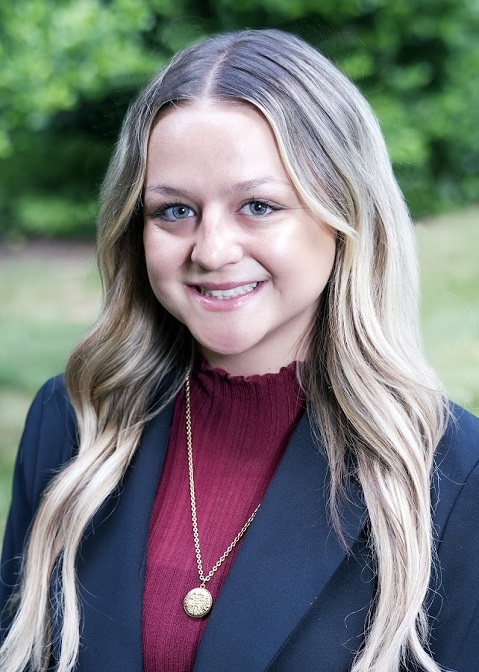
Finding My Niche
June 14, 2024
Hi there! My name is Sam, and I recently graduated from the University of Delaware. I majored in biology, and I've always had a passion for research. As a child, I developed a fascination with science and how the world worked. Playing on my father’s farm, catching strange bugs, and building a terrarium for toads that I caught are among my earliest memories. As I grew, I remained captivated by the mystery of science. College was a period of time when everything was so novel and thrilling, and my innate curiosity and enthusiasm for science motivated me to seek out research possibilities. I began interning at a research lab, and I realized I personally enjoy taking time to understand, perform experiments, think critically, and problem solve. I am a natural self-starter and found that working in a research lab was what I wanted to do. Biomedical research piques my interest the most and I find it fascinating how intricate and varied the mechanisms in which cells respond and communicate with one another are. I plan on attending grad school in the future and am excited to gain more research experience to find my niche.
Fortunately, I received an invitation in my email to tour the cancer center, where I became familiar with Fox Chase's mission and found a place where I could fit in. I was thrilled about the chance to support studies that might benefit patients in the future, and I ultimately decided to apply. I was ecstatic to find out I was admitted to the program and would be a part of the fellowship! Although it was exciting, I was anxious about the new experience. I am a natural introvert and am drained from being around others for too long, especially in new environments. I prefer to work alone so I had some anxiety, particularly during the first week of the program at the “bootcamp”, where we were compelled to dive right into learning. However, it did not take me long to get used to the demanding schedule in the lab because I spent most of my summers working full-time. I gained knowledge every day, whether it was about new lab methods or biological processes. The other fellows and I quickly became friends after we spent a couple of nights playing card games and watching movies together, and once I got to know the people in the lab that I would be working with, everything seemed to make sense.
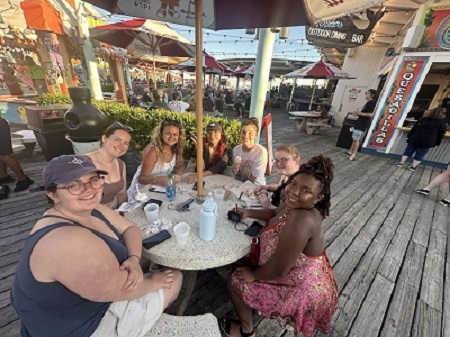 I am now in charge of performing Hi-C and Western blots in the lab of Dr. Yu (Sunny) Liu. The main focus of my work is to research the mechanisms that fold and regulate the genome to discover the three-dimensional nuclear dynamics in cancer. Cancer can be brought on by altered gene expression which is caused by gene domain disorganization. Rebecca Smith, my mentor, has guided me through a variety of lab procedures that help uncover the mechanisms of genome folding. Most notably, I have used the Hi-C technique to capture the conformation of genomes under different conditions to study the interactions between epigenetic alterations and genome regulation. I've been having a great time at Fox Chase so far and it's hard for me to think that two weeks have already passed. Everyone in this place has been incredibly kind and sincerely cares about each and every research fellow. Here, I have developed not just laboratory knowledge but also professional skills. We have listened to guest speakers share how they’ve honed their professional abilities, participated in discussions on scientific papers, and attended career seminars. I'm eager to see what the future here has in store. I am thankful that this immersive experience is giving me an opportunity to find the specific segment of research that interests me.
I am now in charge of performing Hi-C and Western blots in the lab of Dr. Yu (Sunny) Liu. The main focus of my work is to research the mechanisms that fold and regulate the genome to discover the three-dimensional nuclear dynamics in cancer. Cancer can be brought on by altered gene expression which is caused by gene domain disorganization. Rebecca Smith, my mentor, has guided me through a variety of lab procedures that help uncover the mechanisms of genome folding. Most notably, I have used the Hi-C technique to capture the conformation of genomes under different conditions to study the interactions between epigenetic alterations and genome regulation. I've been having a great time at Fox Chase so far and it's hard for me to think that two weeks have already passed. Everyone in this place has been incredibly kind and sincerely cares about each and every research fellow. Here, I have developed not just laboratory knowledge but also professional skills. We have listened to guest speakers share how they’ve honed their professional abilities, participated in discussions on scientific papers, and attended career seminars. I'm eager to see what the future here has in store. I am thankful that this immersive experience is giving me an opportunity to find the specific segment of research that interests me.
Learning What It Mean to Be a Scientist
July 12, 2024
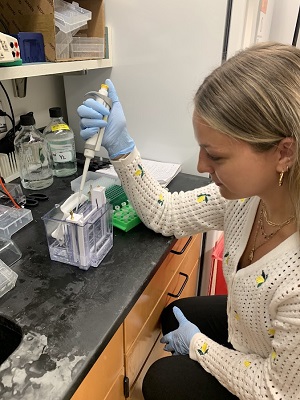 The past few weeks of the fellowship have been quite busy, but it has also been very gratifying, and I have enjoyed diving into my research project. My goal is to find out more about the characteristics of the drug, Trichostatin A (TSA), and its role as an HDAC inhibitor on the 3D structure of the genome. I’m using Hi-C technique and western blots in order to accomplish this. I was unfamiliar with both techniques, so it required a great deal of practice until the methods were mastered. I find the bench work to be incredibly enjoyable, and I was surprised by how the computational data collection for Hi-C is just as essential as the wet lab. We use Hi-C to quantify the interactions between genes and illustrate the 3D genome after the cells are treated with TSA. I perform bench work to prepare the Hi-C samples for sequencing and then computer software is used to create a Hi-C heatmap showing the gene interactions. I also perform western blots to learn more about the proteins of interest and how acetylation affects them. Both Hi-C and western blots are tedious techniques, with Hi-C taking nearly a week to prepare one DNA library for sequencing. This made me realize how important it is for scientists to be able to persevere through repetitive and dull work. While the results from western blots are basically instant, Hi-C takes longer to have the results. I dread waiting because I prefer to know if my experiments work as soon as I’m finished, but I’m learning that patience is key to being a scientist.
The past few weeks of the fellowship have been quite busy, but it has also been very gratifying, and I have enjoyed diving into my research project. My goal is to find out more about the characteristics of the drug, Trichostatin A (TSA), and its role as an HDAC inhibitor on the 3D structure of the genome. I’m using Hi-C technique and western blots in order to accomplish this. I was unfamiliar with both techniques, so it required a great deal of practice until the methods were mastered. I find the bench work to be incredibly enjoyable, and I was surprised by how the computational data collection for Hi-C is just as essential as the wet lab. We use Hi-C to quantify the interactions between genes and illustrate the 3D genome after the cells are treated with TSA. I perform bench work to prepare the Hi-C samples for sequencing and then computer software is used to create a Hi-C heatmap showing the gene interactions. I also perform western blots to learn more about the proteins of interest and how acetylation affects them. Both Hi-C and western blots are tedious techniques, with Hi-C taking nearly a week to prepare one DNA library for sequencing. This made me realize how important it is for scientists to be able to persevere through repetitive and dull work. While the results from western blots are basically instant, Hi-C takes longer to have the results. I dread waiting because I prefer to know if my experiments work as soon as I’m finished, but I’m learning that patience is key to being a scientist.
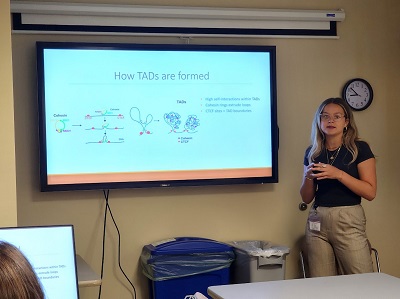 I have also been working on a presentation to be given at a symposium following the fellowship's completion. One of the most important skills of a scientist is the ability to communicate research information effectively to others and this symposium will give me a chance to explain the significance of the data I gather and build on my communication skills. I have a fear of presenting, so this is a kind of exposure therapy for me. I know that for me to be confident and truly proud of my final presentation it will require a great deal of work. It was a victory for me when I was able to face my fear and give a background presentation to some of the other research fellows, Dr. Purdy, Dr. Leystra, and Dr. Austria. I was so pleased that I was able to confidently deliver the information in the way that I wanted during this practice presentation, and I even received helpful feedback to help me polish my slides and delivery. It is clear to me that these skills that I am developing and fine-tuning over this time at Fox Chase will be used throughout my career.
I have also been working on a presentation to be given at a symposium following the fellowship's completion. One of the most important skills of a scientist is the ability to communicate research information effectively to others and this symposium will give me a chance to explain the significance of the data I gather and build on my communication skills. I have a fear of presenting, so this is a kind of exposure therapy for me. I know that for me to be confident and truly proud of my final presentation it will require a great deal of work. It was a victory for me when I was able to face my fear and give a background presentation to some of the other research fellows, Dr. Purdy, Dr. Leystra, and Dr. Austria. I was so pleased that I was able to confidently deliver the information in the way that I wanted during this practice presentation, and I even received helpful feedback to help me polish my slides and delivery. It is clear to me that these skills that I am developing and fine-tuning over this time at Fox Chase will be used throughout my career.
There are relatively few uninteresting moments because this fellowship stretches well beyond the lab. I really love becoming so close with the other fellows and we are lucky we have each other to lean on. We met up and took a beach trip to Wildwood, New Jersey on Juneteenth, which was my first time experiencing a New Jersey beach. The sunshine and relaxation were much needed and it was nice to have time to talk to everyone and come to know them personally, beyond being in the lab. We swam in the ocean and even had pizza delivered to us on the beach. We later took a stroll on the boardwalk and ate ice cream while window shopping. In addition to this beach day, we gathered together for multiple movie nights, game nights, and concerts. We all have a terrific time together taking breaks from our hard work with these excursions.
Expanding as a Scientist: A Summer in the Research Fellowship
August 26, 2024
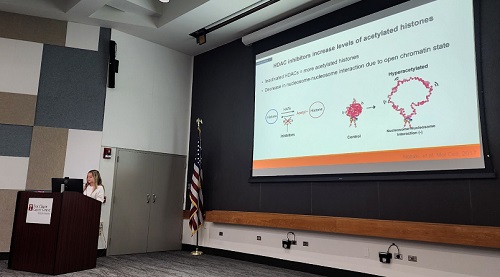 I gained a great deal of knowledge this summer about both my particular study in the mechanisms that fold and regulate the genome, and the techniques used in the Liu Lab, as well as what a career in this field would require. I was able to experience tremendous personal and professional growth. I will always be appreciative that I had the chance to have this journey and for the exposure and practice this summer experience provided. I am excited to use the knowledge and abilities I acquired, and I know that the connections and understanding I gained from this program will follow me into my future work as a scientist.
I gained a great deal of knowledge this summer about both my particular study in the mechanisms that fold and regulate the genome, and the techniques used in the Liu Lab, as well as what a career in this field would require. I was able to experience tremendous personal and professional growth. I will always be appreciative that I had the chance to have this journey and for the exposure and practice this summer experience provided. I am excited to use the knowledge and abilities I acquired, and I know that the connections and understanding I gained from this program will follow me into my future work as a scientist.
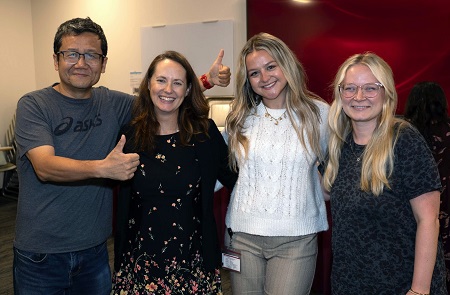 The focus of my summer project was the cell-type specific patterns of histone acetylation. I carried out experiments in an effort to systematically profile histone acetylation patterns across cell lines. After seeing that the histone acetylation patterns were cell-type specific, I hypothesized that the expression levels of HDACs were responsible for the HDACi sensitivity patterns. However, these patterns are not correlated with the expression levels of HDACs. Even though this didn’t match our original hypothesis, I had many interesting discussions with my labmates about other factors that might determine these cell-type specific patterns. We decided that distinct lysine accessibility across cell lines most likely determines the cell-type specific patterns of histone acetylation.
The focus of my summer project was the cell-type specific patterns of histone acetylation. I carried out experiments in an effort to systematically profile histone acetylation patterns across cell lines. After seeing that the histone acetylation patterns were cell-type specific, I hypothesized that the expression levels of HDACs were responsible for the HDACi sensitivity patterns. However, these patterns are not correlated with the expression levels of HDACs. Even though this didn’t match our original hypothesis, I had many interesting discussions with my labmates about other factors that might determine these cell-type specific patterns. We decided that distinct lysine accessibility across cell lines most likely determines the cell-type specific patterns of histone acetylation.
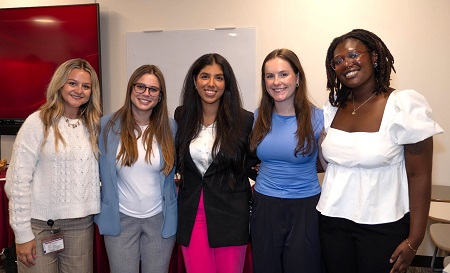 Even though I was given significant responsibility, I enjoyed the lab work and felt quite competent and supported as I worked through the experiments. I picked up skills in everything from western blots to cell culture, but most significantly, I learned how to solve problems and learn from mistakes. Conquering setbacks and discovering answers proved to be very fulfilling. At the end of the fellowship, it was great to be able to display my work at the Fox Chase Empower Fellowship Cancer Research Symposium. The final symposium required a great deal of preparation. The last minute data collection and presentation finishing touches made it feel like a race against time. I was motivated to provide the best presentation I could by Drs. Purdy and Austria. They have greatly helped me improve my speaking abilities. Seeing my study as a PowerPoint on the large screen made me feel very accomplished! I educated other scientists about my work and its future direction, which was a terrific learning opportunity. I am incredibly appreciative to show off the effort I put forward this summer to my friends, labmates, and the other labs.
Even though I was given significant responsibility, I enjoyed the lab work and felt quite competent and supported as I worked through the experiments. I picked up skills in everything from western blots to cell culture, but most significantly, I learned how to solve problems and learn from mistakes. Conquering setbacks and discovering answers proved to be very fulfilling. At the end of the fellowship, it was great to be able to display my work at the Fox Chase Empower Fellowship Cancer Research Symposium. The final symposium required a great deal of preparation. The last minute data collection and presentation finishing touches made it feel like a race against time. I was motivated to provide the best presentation I could by Drs. Purdy and Austria. They have greatly helped me improve my speaking abilities. Seeing my study as a PowerPoint on the large screen made me feel very accomplished! I educated other scientists about my work and its future direction, which was a terrific learning opportunity. I am incredibly appreciative to show off the effort I put forward this summer to my friends, labmates, and the other labs.
Additionally, I have formed many bonds with my labmates and the other fellows in this program. They’ve all worked hard while still making time for enjoyment and decompression. Rebecca Smith, my mentor, has been tremendously supportive and has gone above and beyond to help me. My
best memories are going to the beach in Wildwood, New Jersey and taking numerous trips to Philadelphia with the other fellows. I’m really happy we all met and I know we’ll all stay in touch. I could not have done this research project without the help and direction from the Liu Lab, my mentor Rebecca Smith, the directors and fellows of the Empower Fellowship, and those that funded the program.